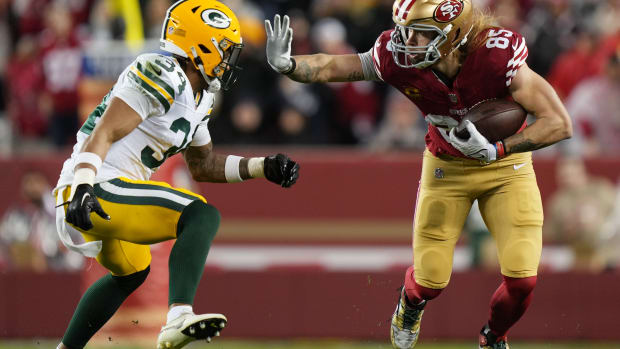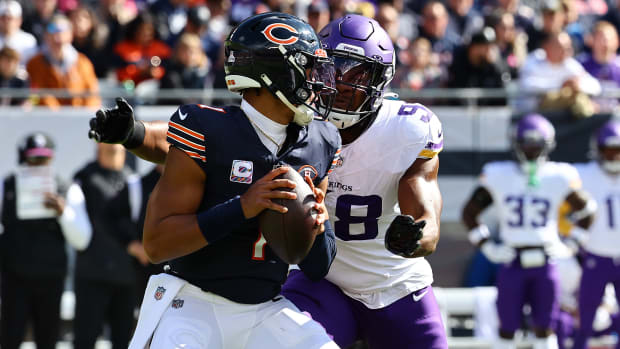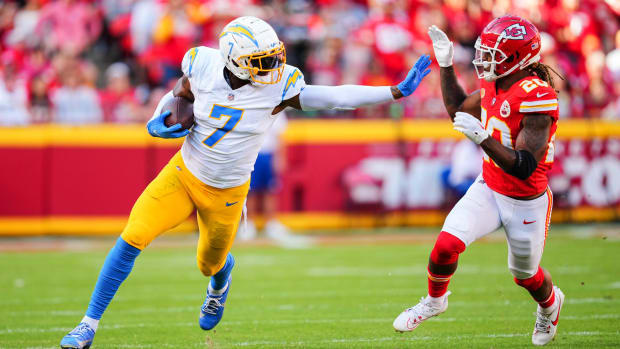Changing Return Game Means Altered Thinking
One of the problems finding a return man to replace Cordarrelle Patterson for the Bears is simply there are very few even comparable talents.
Then again, they do not need one of the all-time greats returning kicks in the NFL with rules as they are limiting kicks. Perhaps 10 or 12 years ago they did, but now a team can get by without a special returner. They simply need someone who isn't a fumble waiting to happen, and also a good group of blockers.
The rule change moving up kickoffs to discourage kick returns for the sake of safety has also inadvertantly brought in an entirely different type of return man.
Teams are circumventing the rule by kicking off shorter intentionally and return men who can field a ball with less time to build up a head of steam before tacklers arrive will have a better chance in such situations. Players who used to be thought of only as punt returners might have a better chance on kick returns now because the return game on kicks used to be one cut and speed. Now, multiple cuts or stop-and-start returns might be required.
It simply doesn't work for NFL teams to draft or sign an undrafted free agent who ranked among the top kick returners. There is a 53-man roster to remember and the player needs to be good enough at other skills to serve a purpose on Sunday should injuries occur.
This is why return men like Patterson were more valuable than others. He performed a function on special teams beyond returns, and also tried to help as a backup on offense, although he wasn't exactly successful. He just wasn't worth $5 million when the salary cap shows April 15 you've got $523,000 available according to Spotrac.com.
On the other hand, there is danger at using explosive wide receivers, running backs or cornerbacks chosen early in the draft to return punts or kicks. Special teams remain one of the better ways to get injured in the NFL.
Players like Devonta Smith, Jaylen Waddle and Kadarius Toney have the definite skill to help teams as return men but who would want to risk getting a Day 1 or second-round draft pick injured this way? D'Wayne Eskridge of Western Michigan is a real breakaway return threat but has been roaring up the draft boards and may go too early to be considered for extensive use on special teams, as well.
The Bears could also use a punt returner. Tarik Cohen was one of the best Bears offensive threats and they lost him last year making a fair catch. So why risk valuable offensive players in this way?
There has been plenty of Bears interest in Purdue's Rondale Moore, and he has great return potential. However, the same applies to a true breakaway threat at slot receiver.
Another player, Anthony Schwartz, ran the fastest 40 in pro days at 4.26 but is it worth converting a possible second- or third-round pick even to be a special teams player when that speed could mean much more on offense? Kick returns are being phased out anyway.
The best route is still finding a player later in the draft who can be a backup and bring strong special teams skills. Here are some players for Bears consideration in this draft
Khalil Herbert, Virginia Tech
Considered a mid-to-late round draft pick at running back, he'd be an ideal backup and return man. The 5-9, 212-pounder averaged 7.6 yards and ran for 1,183 yards last year as a fifth-year transfer with the Hokies, and had averaged 8.9 yards on just 43 carries at Kansas the previous year. For his career, he averaged 6.1 yards a carry with 22 rushing TDs, but last year was wisely involved as a return man for the first time and showed he has potential there as he averaged 26.9 yards on 16 returns.
Marquez Stevenson, Houston
A real multithreat as a 6-1, 190-pound receiver, he displayed great big-play potential earlier in his career as a receiver with 75 catches for a 13.6-yard average in 2018 but since then his production tailed off to 72 receptions total the next two seasons for 13 TDs. He has been deadly throughout as a return man, breaking three for TDs and averaging 26.1 yards on 34 career attempts.
Dazz Newsome, North Carolina
A 1,000-yard slot receiver in 2019 for a team with tremendous running backs, Newsome has not really been a kick returner but has returned punts. He made a few kick returns, but averaged a very strong 11.6 yards for 48 college punt returns. He returned just seven kicks for a 20.6-yard average, but on offense produced 18 TD catches with 188 receptions, 2,435 yards and had 20 runs for 8.9 yards with two TDs. He lacked the kind of overall explosiveness needed to go in the draft and NFL Draft Bible considers him an undrafted free agent possibility.
Trestan Ebner, Baylor
A 5-11, 208-pound backup running back who struggled last year to a 2.1-yard rushing average, he did get serious about returns for the after dabbling at it earlier and enjoyed great success with 19 attempts, a whopping 32.2-yard average and two TD returns. He also returned nine punts. As a running back, he had 891 yards and seven TDs for his career, but showed he can be a threat in the passing game with 99 receptions for 1,231 yards and nine TDs.
Kene Nwangwu, Iowa State
A former backfield mate of David Montgomery's, his career started off well as a return man and reserve running back but then he suffered an Achilles tear after his 2016 season and took a few years to get back to full speed. At 6-1, 210, he can run through tackles on a return but has the speed and vision needed to break it. He averaged 5.2 yards per 143 rushing attempts and was consistently good as a kick returner, never averaging below 25.4 yards for any season and topping out last year at 28.9 for a 26.8-yard career average with one TD.
Avery Williams, Boise State
A real special teams mad man and energetic slot cornerback, Williams would be worth taking in the draft simply to let him block kicks but NFL Draft Bible considers him an undrafted free agent type. At Boise State, he blocked a field goal, a point-after and three punts. He surprised with a 4.41-second 40-yard dash. His coverage ability at cornerback has been questioned, but his quickness and physical play may account for any deficiencies if used at slot corner, and he was able to make four interceptions with 22 pass defenses. He has forced five fumbles and recovered three. Williams returned 38 kicks for a 27.4-yard average, including three TDs. He also returned 82 punts for an elite 11.6-yard average with six for TDs.
Bryson Denley, Bowling Green
A 5-9, 186-pound back who ran 4.56 at his pro day 40. Denley has been an all-purpose type who split carries in the backfield but also had 37 career kick returns for a 23.2-yard average. His best return season was last year with a 27.5-yard average on kicks. In 2019, he displayed multiple purposes on offense for the first time with a career-high 111 carries for 544 yards, four TDs and 27 receptons for 267 yards with three TDs.
Ihmir Smith-Marsette, Iowa
Considered a seventh-round possibility in the draft by NFL Draft Bible, his hands and route running make him only a marginal player for a roster. However, his return potential can earn him what's needed to stick. He had extensive return experience before making only eight returns last year, and averaged 29.5 nad 29.6 yards a return as a sophomore and junior to finish his career at 28.7 yards a return with two touchdowns. Smith-Marsette also had 110 receptions for 1,615 yards and 14 TDs. He also averaged 8.1 yards per 34 rushing attempts. A lean, taller receiver who has good speed and vision downfield at 6-1, 179 pounds.
Twitter: BearDigest@BearsOnMaven




